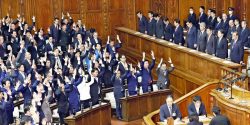- Yomiuri Editorial
- Upper house election campaigning begins
Parties must present specific measures to get through turbulent times / Dealing with soaring prices is an urgent task
13:03 JST, June 22, 2022
There is an urgent need to rebuild the nation’s economy, which has been battered by the coronavirus pandemic and soaring prices. Each party’s response to the unstable international situation will also be tested. It is hoped that the upper house election will be an opportunity to think about the course Japan should take.
Campaigning for the 26th House of Councillors election officially kicks off Wednesday. A total of 125 seats — 124 up for reelection and one seat to fill a vacancy in the Kanagawa constituency — will be contested. This is the first full-fledged national election in which the performance of the administration of Prime Minister Fumio Kishida, which was inaugurated in October last year, will be tested.
Blurred policy lines
The government has been pushing ahead with COVID-19 vaccine booster campaigns. In foreign policy, it has imposed harsh sanctions on Russia for its invasion of Ukraine.
However, it is also true that the government has shelved difficult issues, such as promoting legislation to strengthen administrative authority to secure hospital beds.
There is concern that the Ukraine crisis will be prolonged. In the medium- to long-term, Japan must deal with structural problems, such as the declining birth rate and a graying society, and thus a decreasing population.
Under the political system that came into existence in 1955, in which the Liberal Democratic Party and the former Japan Socialist Party were locked in a fierce rivalry, ideological conflicts between conservatives and reformists were evident. Now, however, many political parties are advocating the importance of wage hikes, and with the exception of some opposition parties, security policies are also becoming similar.
In the face of unprecedentedly difficult situations, and with conventional policy differences among political blocs becoming less clear, the parties and their candidates have a responsibility to present clear solutions to various issues. It is important to eliminate uncertainty about the future and restore social vitality.
The biggest point of contention is economic policy that focuses on measures to counter rising prices. Electricity and gas bills, among others, have soared, and prices of daily necessities also have risen.
At an in-person debate organized by the Japan National Press Club featuring the leaders of nine parties, Kishida, the president of the ruling LDP, said his party would “focus its policies on soaring energy and food prices.”
The government has raised the ceiling on subsidies to oil wholesalers to curtail gasoline prices. It said it would also establish a system to return the benefits to households and businesses that cooperate in saving electricity.
Wage hike road map
The ruling coalition of the LDP and Komeito needs to devise ways to support businesses and households affected by rising prices.
Kenta Izumi, the leader of the Constitutional Democratic Party of Japan, stressed the need to lower the consumption tax rate to 5% temporarily. “A consumption tax rate cut is a very effective measure to stimulate consumption,” he said. Yuichiro Tamaki, the leader of the Democratic Party for the People, said, “We’ll convert economic policies into aggressive spending,” proposing a uniform cash handout of ¥100,000.
The country’s finances have become increasingly severe as a result of repeated fiscal spending to combat the coronavirus pandemic. It cannot be said that it is appropriate to reduce the consumption tax — a stable revenue source for social security — or to provide a large-scale cash handout. It is important to realize a virtuous cycle in the economy by linking wage growth to increased consumption.
At the debate, party leaders expressed their willingness to raise wages, but it must be said that concrete measures to achieve this goal were scarce. It is hoped that during upper house election campaigning, a path toward sustainable wage increases will be discussed in depth.
In the wake of the crisis in Ukraine, public interest in security policy has increased more than ever.
How to maintain deterrence
The LDP is aiming to increase defense spending, keeping in mind the North Atlantic Treaty Organization (NATO) goal of a defense budget of at least 2% of gross domestic product. “We will strengthen our defense capabilities over the next five years,” Kishida said at the debate.
With fiscal constraints in place, will the LDP be able to secure public understanding if the defense budget alone gets special treatment? It is also essential to discuss how to secure the source of funds for such efforts.
Regarding the issue of whether to possess counterattack capabilities to defend against armed attacks, Komeito leader Natsuo Yamaguchi only said, “The introduction of missiles has been decided, but how to use them and other issues should be discussed from now on.” Kazuo Shii, chairperson of the Japanese Communist Party, stated, “We cannot keep the peace by focusing only on military affairs.”
There is a high possibility that Japan’s current missile defense system will not be able to intercept the hypersonic missiles being developed by countries such as China and North Korea. Security policy needs to be discussed realistically in light of the growing threats.
Regarding the timing of moves to initiate constitutional revision in the Diet, Ichiro Matsui, the leader of Nippon Ishin no Kai (Japan Innovation Party), said, “If the forces [positive about constitutional amendment] gain substantial power in the upper house, the schedule [for initiating constitutional revision] should be arranged to coincide with unified local elections next spring.” It is hoped that each party will constructively discuss what the supreme law should be like in these turbulent times.
In this election, the LDP and Komeito decided not to enforce mutual endorsements of their candidates that had been initiated by their party headquarters in the past. Instead, decisions were left up to their local organizations. Although they have ended up cooperating in most constituencies, subtle policy differences may be evident between the two parties.
In the 2016 and 2019 upper house elections, the opposition camp made arrangements to file a candidate in 32 constituencies in which only one seat was up for grabs. This time, however, their united front is limited to 11 such constituencies. This will test the real strength of each opposition party.
(From The Yomiuri Shimbun, June 22, 2022)
Top Articles in Editorial & Columns
-

40 Million Foreign Visitors to Japan: Urgent Measures Should Be Implemented to Tackle Overtourism
-

University of Tokyo Professor Arrested: Serious Lack of Ethical Sense, Failure of Institutional Governance
-

China Provoked Takaichi into Risky Move of Dissolving House of Representatives, But It’s a Gamble She Just Might Win
-

Policy Measures on Foreign Nationals: How Should Stricter Regulations and Coexistence Be Balanced?
-

PM Takaichi Should Help Young Japanese Break Seniority Barrier to Vitalize Politics
JN ACCESS RANKING
-

Japan Institute to Use Domestic Commercial Optical Lattice Clock to Set Japan Standard Time
-

Israeli Ambassador to Japan Speaks about Japan’s Role in the Reconstruction of Gaza
-

Man Infected with Measles May Have Come in Contact with Many People in Tokyo, Went to Store, Restaurant Around When Symptoms Emerged
-

Prudential Life Insurance Plans to Fully Compensate for Damages Caused by Fraudulent Actions Without Waiting for Third-Party Committee Review
-

Woman with Measles Visited Hospital in Tokyo Multiple Times Before Being Diagnosed with Disease




















